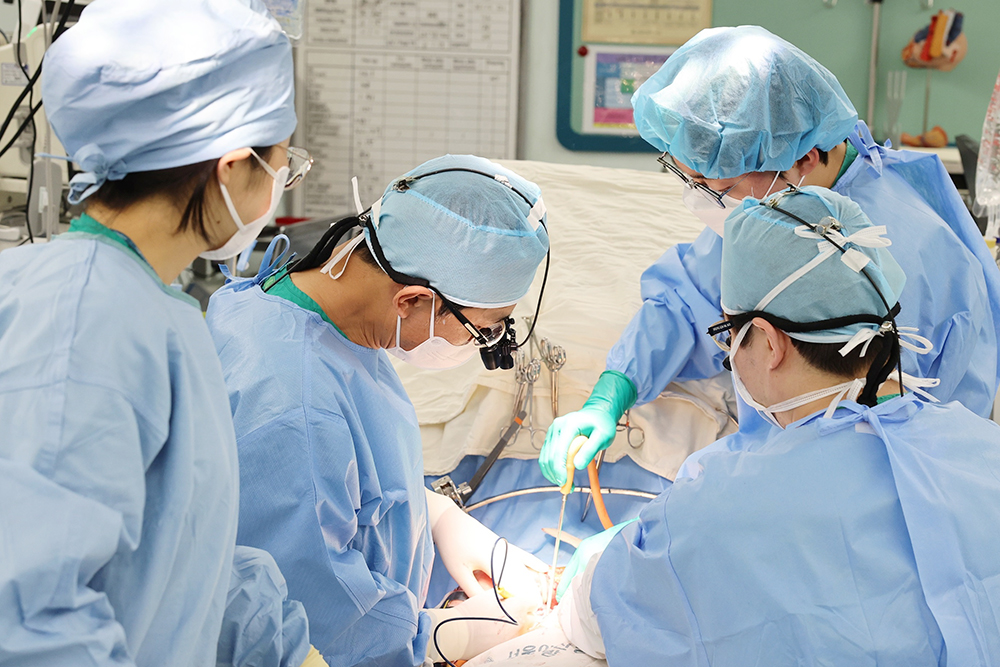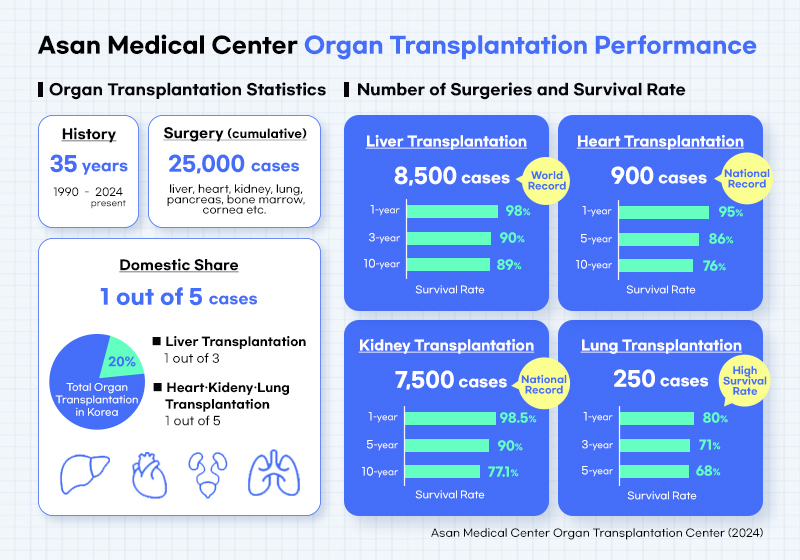-
- Global AMC MENU
- NEWS
- HEALTH
- PEOPLE
- Introduction
One in Three Liver and One in Five Heart, Kidney, and Lung Transplantations in Korea Performed
One-Year Survival Rates: Liver 98%, Heart 95%, Kidney 98.5%, Lung 80%... Achieving Global Standards
"Continuously Striving to Enable Organ Failure Patients to Live High-Quality Lives for Many Years to Come"
 ▲ The AMC liver transplantation team of the Organ Transplantation Center is urgently performing a liver transplantation for Mr. Lee, who is suffering from end-stage liver cirrhosis, on the 17th (Wednesday), removing a portion of his son's healthy liver for transplantation. Professor Gi-Won Song of the Division of Liver Transplantation and Hepatobiliary Surgery at Asan Medical Center is depicted second from the left.
▲ The AMC liver transplantation team of the Organ Transplantation Center is urgently performing a liver transplantation for Mr. Lee, who is suffering from end-stage liver cirrhosis, on the 17th (Wednesday), removing a portion of his son's healthy liver for transplantation. Professor Gi-Won Song of the Division of Liver Transplantation and Hepatobiliary Surgery at Asan Medical Center is depicted second from the left.
Thirty years ago, before even celebrating the first birthday, an infant awaited death grew into a healthy young adult through Korea’s first attempted living-donor liver transplantation at the time. A young girl, whose weak heart made even her own survival uncertain, underwent two heart transplantations and eventually became a mother, bringing another life into the world.
Asan Medical Center (AMC) has been relentless in its pursuit of breakthroughs since the early days of organ transplantation in Korea, providing miraculous new lives to 25,000 patients suffering from organ failure.
Since 1990, the Organ Transplantation Center of Asan Medical Center has performed over 25,000 organ transplantations, including liver, heart, kidney, lung, pancreas, cornea, and bone marrow. The survival rates after transplantation are impressive, with one-year survival rates of 98% for liver, 95% for heart, 98.5% for kidney, and 80% for lung transplantations, showcasing outcomes on par with or surpassing those of leading organ transplantation centers worldwide.

According to statistics from the National Institute of Organ, Tissue and Blood Management (KONOS), Asan Medical Center conducts 20% of all organ transplantations performed annually in Korea. It oversees one out of every three liver transplantations, and one out of every five heart, kidney, and lung transplantations nationwide.
Liver transplantation, in particular, boasts outstanding numbers, with over 8,500 surgeries performed and survival rates of 98% at one year, 90% at three years, and 89% at ten years, showcasing some of the best results globally. Noteworthy recipients of liver transplantation from Asan Medical Center include the longest-surviving liver transplantation recipient in Korea (42 years old in 1992), the first pediatric living-donor liver transplantation recipient (9 months old in 1994), the first adult living-donor liver transplantation recipient (38 years old in 1997), the world's first modified right-lobe liver transplantation recipient (41 years old in 1999), and the world's first 2-to-1 living-donor liver transplantation recipient (49 years old in 2000), all leading healthy lives to this day.
Eighty-five percent of liver transplantation at Asan Medical Center involves living-donor liver transplantation, where a portion of a living donor's liver is transplanted. Asan Medical Center excels in ABO-incompatible living-donor liver transplantation, a high-risk immunological category, demonstrating outcomes comparable to those of blood-type compatible liver transplantation. This achievement is particularly significant amidst a severe shortage of deceased organ donors compared to Western countries, driving efforts to develop various surgical techniques to save more lives.
Asan Medical Center also prioritizes the safety of liver donors in addition to transplantation recipients. Donor hepatectomy using laparoscopy and minimal incisions reduces the donor's recovery period and minimizes scarring, contributing to a higher quality of life. Notably, there have been no deaths or severe complications among living liver donors.
Since its inception with the first domestic heart transplantation in 1992 for a 50-year-old woman suffering from end-stage cardiomyopathy, Asan Medical Center has amassed a record of over 900 heart transplantations, the highest in Korea. The survival rates stand at 95% at one year, 86% at five years, and 76% at ten years, significantly surpassing the survival rates of the International Society for Heart and Lung Transplantation (ISHLT).
Despite the challenges of relying solely on donations from brain-dead individuals, heart transplantation recipients have shown impressive survival rates, surpassing those reported by the International Society for Heart and Lung Transplantation (ISHLT), with one-year survival rates of 95%, five-year survival rates of 86%, and ten-year survival rates of 76%.
Despite the high success rates of heart transplantation, patients with end-stage heart failure face an uncertain wait due to the reliance on donations from brain-dead individuals. Asan Medical Center addresses this issue by implanting left ventricular assist devices (pumps to assist heart function), acting as artificial hearts, in patients who have to rely on medication for prolonged periods awaiting heart transplantation or for whom heart transplantation is not feasible, preventing symptom deterioration and improving their quality of life. To date, over 100 LVAD implants have been performed.
Kidney transplantation at Asan Medical Center is equally remarkable. Since 2015, Asan Medical Center has performed over 400 kidney transplantations annually, totaling over 7,500 procedures, targeting end-stage renal failure patients who would otherwise require lifelong dialysis. The survival rate of transplanted kidneys (the percentage of patients with well-functioning kidneys post-transplantation, eliminating the need for dialysis or re-transplantation) stands at 98.5% at one year, 90% at five years, and 77.1% at ten years, comparable to the United Network for Organ Sharing (UNOS) kidney transplantation survival rates of 99.9% at one year and 85.4% at five years.
Asan Medical Center ensures the safe conduct of kidney transplantation even in cases where crossmatch testing results, conducted to assess the compatibility of donor and recipient blood types or tissue compatibility, are positive, indicating a high risk of rejection. Recently, robotic-assisted kidney transplantation has been actively performed, with over 100 cases, demonstrating clinical outcomes comparable to those of open surgery.
Since the first lung transplantation for a patient with idiopathic pulmonary fibrosis using lungs from a brain-dead individual in 2008, Asan Medical Center has conducted over 250 lung transplantations to date. Among them are patients who suffered severe lung damage due to humidifier disinfectants and those who lost lung function due to post-COVID-19 complications.
Despite nearly 70% of the 250 lung transplantation recipients being severely ill patients who had been maintained on extracorporeal membrane oxygenation (ECMO) or mechanical ventilators for prolonged periods, the survival rates post-transplantation are impressive, at 80% at one year, 71% at three years, and 68% at five years. These rates exceed the International Society for Heart and Lung Transplantation (ISHLT) lung transplantation survival rates, which combine data from leading lung transplantation centers worldwide, with rates at 85% at one year, 67% at three years, and 61% at five years.
Unlike other organs such as the liver, heart, or kidney, lungs have fewer donations from brain-dead individuals, resulting in long waiting times for transplantation and a high risk of infection due to continuous exposure to external air during the respiratory process. Even rejection of transplanted lungs tends to be severe, making post-transplant survival rates relatively lower. Asan Medical Center has elevated survival rates to a global standard through an advanced critical care management system, appropriately regulating immunosuppressant therapy and assisting in proper respiratory rehabilitation exercises for transplantation patients.
Director Shin Hwang of the Organ Transplantation Center at Asan Medical Center (Professor of the Division of Liver Transplantation and Hepatobiliary Surgery) stated, "The driving force behind our ability to provide noble lives to 25,000 patients to date was the sense of mission to save even the most critically ill patients. Through relentless research and challenges driven by the determination to save lives, organ transplantation at Asan Medical Center has now reached a global standard. We will continue our efforts to enable many patients with organ failure to live a high-quality life for many years to come."
The Organ Transplantation Center at Asan Medical Center comprises organ-specific transplantation teams and dedicated transplantation coordinators (nurses), actively conducting various activities from counseling for organ donors and recipients to registration, management, clinical organ transplantation, provision of organ transplantation information and education, promotion activities, and experimental transplantation research.












